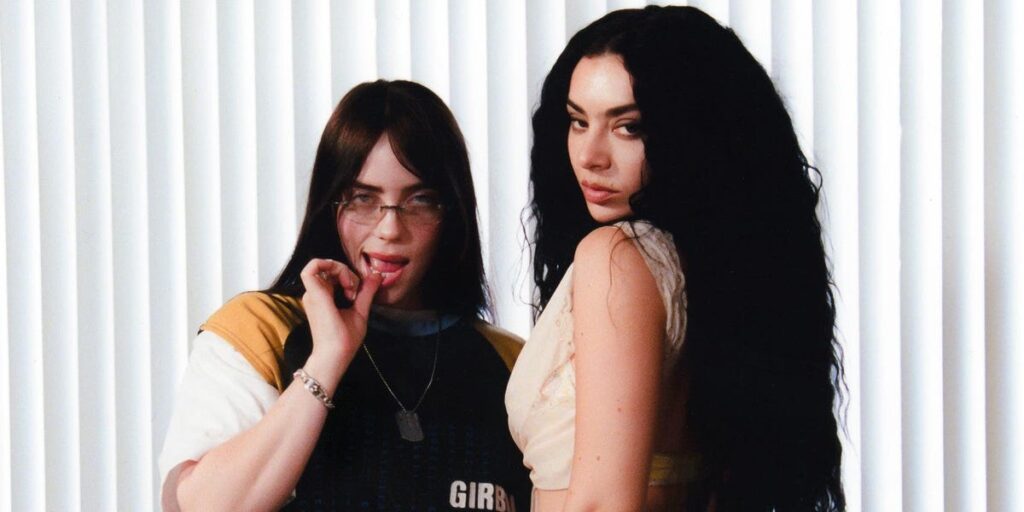Billie Eilish has gleefully joined the extended “Brat” universe with her featured spot on “Guess,” a fan-favorite track from Charli XCX’s latest album.
The much-anticipated “Guess” remix dropped on Thursday with an accompanying music video, which portrays Charli and Eilish as flirty underwear fiends who, at one point, roll down a mountain of bras and lingerie.
The whole thing is fun, cheeky, and deeply entertaining, a vibe the kids online might describe as “unserious.”
It’s the latest in a series of “Brat” remixes that feel like proper stop-what-you’re-doing-and-listen events, rather than cash grabs or flagrant bids for higher Billboard peaks.
Eilish joins a fascinating cast of characters that includes Addison Rae (“Von Dutch“), Robyn and Yung Lean (“360“), and especially Lorde, whose self-awareness and vulnerability on the “Girl, So Confusing” remix thrilled fans and critics alike, transforming her appeal to “work it out on the remix” into an internet phenomenon overnight.
Each remix adds a new dimension to the original track, referencing and expanding the lore that surrounds “Brat” and Charli’s entire career: Rae sings that people have “a lot to say” about her debut EP, which included the song “2 Die 4,” a collaboration with Charli that helped legitimize Rae’s arrival in the music world (or at least, the corners of the world where gay people like to hang out); Charli, Robyn, and Yung Lean all trade quips about their talent and status as “three child stars out here doing damage,” sounding like a cult-classic reboot of Timbaland, Justin Timberlake, and Nelly Furtado’s “Give It To Me.” Most notably, “Girl, So Confusing” was entirely inspired by Charli’s competitive history with Lorde, a rich conflict that Lorde defuses with a masterful stroke: “I’m glad I know how you feel, ’cause I ride for you Charli.”
Now, with “Guess,” Eilish enters as both a foil and hopeful love interest. She sing-raps as if she’s responding to Charli’s original lyrics, breaking the fourth wall with a seductive wink: “Charli likes boys, but she knows I’d hit it.”
Eilish began publicly identifying as queer earlier this year. Her single “Lunch,” released in May, doesn’t just use female pronouns for her muse — it’s a full-on ode to sapphic lust and oral sex. In the “Guess” remix, Charli tweaks her own verse as a nod to Eilish’s new era: “Wear ’em, post ’em, might remix it / Eat it up for lunch, yeah, it’s so delicious.”
These self-referential details are vital to the world-building magic of “Brat.”
Charli name-drops her friends and collaborators throughout the album, adding new phrases to the chronically online lexicon: “I’m everywhere, I’m so Julia,” “You gon’ jump if AG made it,” and “I wanna dance with George, I wanna dance to Sophie” refer to actor and internet fave Julia Fox, producer AG Cook, Charli’s fiancé George Daniel, and the late hyper-pop visionary Sophie, respectively.
Charli’s lyrical specificity makes everything feel like an inside joke, as if she’s throwing a house party for her inner circle and you somehow managed to snag an invite. All of “Brat’s” featured artists so far have understood this shared language and adopted it flawlessly. They’re enthusiastically engaged with their surroundings.
Crucially, none of them simply hover inside the song like a plus-one standing in the foyer — which seems to be the standard approach to pop remixes these days.
The majority of those tend to be near-identical copies of the original recordings, with the only significant difference being that the lead artist’s vocal has been reduced or dialed down to accommodate a feature. These “remixes,” if you can even call them that, do nothing to elevate what already exists. Culprits like Lizzo’s “Good As Hell” featuring Ariana Grande, Taylor Swift’s “Karma” featuring Ice Spice, and Grande’s “Yes, And?” featuring Mariah Carey come to mind. Eilish herself was guilty of this trend back in 2019, when she allowed Justin Bieber to make “Bad Guy” worse.
You can tell these features were likely recorded remotely, but more to the point, none of these guests seem particularly engaged with the song or the role they’ve been entrusted with; there’s no curiosity, no chemistry. (That’s not to say these artists don’t respect and admire each other. I’m sure they do. But clearly, that isn’t enough to create a worthwhile duet.)
Consider, too, the recent trend of releasing an “EP pack” with extended, instrumental, a capella, slowed, and sped-up versions of a song, presumably as TikTok bait, to help boost a song’s performance on the charts. No creativity is required in that strategy — nor does there seem to be much effort involved — and yet it’s become a dominant strategy in the current streaming era.
These kinds of releases fail to make waves, even within the artists’ own fanbases, because the approach is dispassionate, predictable, and obviously intended to juice streams.
By contrast, Charli and her collaborators are clearly aiming to create something new. Each “Brat” remix is arguably as good as the original, yet distinct and unique in its own right. (Here, I must insert a shoutout to Dua Lipa’s 2020 remix album “Club Future Nostalgia,” a project truly ahead of its time. Charli, if you’re reading this, “Club Brat” when?)
Charli’s approach speaks to the mutable, experimental nature of dance-pop and club music. These songs become living documents when the right producers and singers are brought into the mix — and then again when crowds breathe new life into them, inspiring tweaks and adjustments with their reactions.
Charli doesn’t have anything to prove, but if “Brat” has cemented anything, it’s her unique talent for curation, dialogue, and synergy — all of which are much-needed in today’s formulaic pop landscape.
Read the full article here


